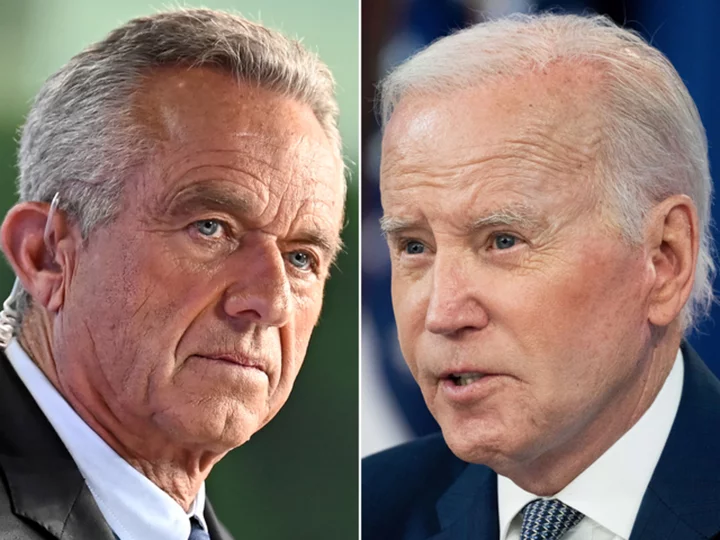Joe Biden's approval ratings remain low. A majority of Democrats don't want him to run for another term.
This would seemingly open the door to a primary challenge. And lo and behold, environmental lawyer and anti-vaccine activist Robert F. Kennedy Jr. has continued to post fairly strong polling numbers in the Democratic primary, garnering between 15% and 20% nationally.
So could Kennedy win any 2024 primaries that Biden contests? That seems unlikely when you consider his ceiling of support among Democrats.
Kennedy declared his candidacy in mid-April, joining author Marianne Williamson as a Democratic presidential challenger. He immediately started registering in the polls, hitting 19% in a Fox News survey after his campaign announcement. Since then, he's stayed close to that 19%. He hasn't, however, gone above that figure in the polling average.
This puts Kennedy more than 40 points behind Biden in national Democratic primary surveys. The president is averaging in the mid-60s nationally, and there is zero sign his support is weakening.
For Biden to start dropping, Democrats would have to stop thinking he's doing a good job as president. Biden's approval rating among Democrats in a Quinnipiac University poll released last week was 84%. Just 16% either disapproved (13%) or didn't hold a view (3%).There is no precedent -- at least since World War II -- of an incumbent president losing a contested state primary while polling above 70% nationally within his party.
Over the past 50 years, the two biggest primary challenges to incumbents occurred in 1976, when Gerald Ford's approval rating among Republicans was in the 60s, and in 1980, when Jimmy Carter's approval rating among Democrats was in the 60s.
Biden also scores high on a slightly different intraparty metric: His favorability rating is at 85% on average. That is, most Democrats think he's doing a good job as president and are fans of him personally.
This leaves very little room for a Kennedy boomlet. He's getting a disproportionate share of support from those who are not part of Biden's Democratic majority. In our most recent CNN/SSRS poll, Kennedy was supported by 12% of potential Democratic primary voters who approved of and had a favorable view of Biden. He did significantly better, 40%, among Democrats who either didn't approve or didn't hold a favorable view of Biden.
Kennedy's other big problem goes beyond Biden. While the vast majority of Democrats like the president, the same cannot be said for Kennedy. A mere 25% of Democratic voters had a favorable view of him in the Quinnipiac poll -- 39% had an unfavorable view. Among self-identified "strong Democrats" in a May Marquette law school poll, the split was 27% favorable to 50% unfavorable for Kennedy.
Kennedy's biggest source of support comes from outside the Democratic Party. The Quinnipiac survey put his ratings among Republicans at 40% favorable to 18% unfavorable.
Per the CNN poll, Kennedy garnered 35% among Democratic primary voters who identified as non-liberal (i.e., moderate or conservative) independents. He got 10% among liberal Democrats. Kennedy's averaging about 15% support among self-identified Democrats of any ideology.
This is a big issue for him because the vast majority of people who vote in Democratic primaries are Democrats.
Kennedy's lack of a base among core Democratic primary constituencies shouldn't be surprising given that the party apparatus is behind Biden. Kennedy is left to being pumped up mostly by those on the right, which no doubt is contributing to his higher numbers with that group.
This doesn't mean Kennedy won't end up winning some Democratic primaries uncontested by Biden next year. Biden may leave his name off the ballot in Iowa and New Hampshire, if they defy the Democratic National Committee and hold nominating contests before the newly sanctioned first-in-the-nation primary in South Carolina.
A Democratic president losing a primary after leaving his name off the ballot wouldn't be unprecedented. In 1996, Bill Clinton didn't appear on the North Dakota primary ballot because the contest violated DNC rules partly by being held too early. Perennial candidate Roland Riemers won that primary. ("Uncommitted" won the 1996 Michigan Democratic primary after Clinton left his name off the ballot for similar reasons.)
The 1996 primary is analogous to the current one in another way too. Kennedy's share of the vote (15% to 20% nationally) against Biden is exactly what Jesse Jackson was getting in primary surveys in the summer of 1995 against Clinton (who posted similar approval ratings among Democrats as Biden does now).
Kennedy, like Jackson, has a well-known name in Democratic presidential politics. But Jackson, unlike Kennedy, had earned that name recognition through previous hard-fought presidential bids. He ended up not running in 1996 as either a Democrat or independent.
Kennedy looks like he'll continue with his campaign for the foreseeable future. But unless something dramatically changes, the outcome will be the same as it was in 1996: an easy primary win for the incumbent.

